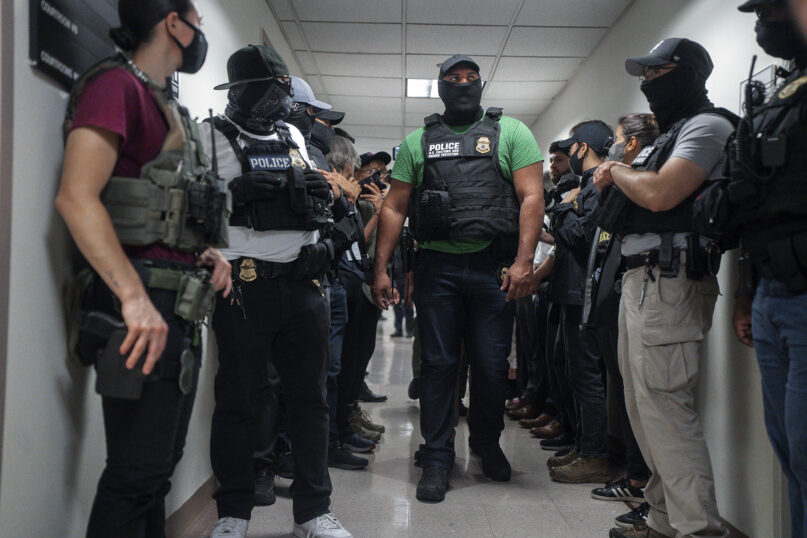(RNS) — Some religious groups are expressing confusion and disapproval over new guidelines dictating how President Donald Trump’s administration doles out government grants, with some arguing the efforts are built to further the White House’s hardline conservative agenda and may infringe on the religious freedom of applicants.
For months, controversy has swirled around the Nonprofit Security Grants Program, a federal initiative created in 2004 largely at the urging of Jewish groups. The effort, which is administrated by FEMA but overseen by the United States Department of Homeland Security, provides millions of dollars annually to improve security for nonprofits — including religious organizations and houses of worship across the U.S.
But earlier this year, DHS unveiled new terms and conditions for grants, including requiring recipients to cooperate with immigration enforcement officials, refrain from operating “any programs that advance or promote DEI” and avoid “discriminatory prohibited boycott.”
In May, a lawsuit was filed by 20 state attorneys general against DHS over conditions to FEMA funding, including the security grants program.
Asked about the new requirements, a DHS spokesperson initially suggested they were tied specifically to how the funds were used, saying in a statement that “funds may only be used for security measures such as cameras, fencing, access controls, and staff training, not for climate projects, DEI initiatives, or unrelated activities.” But the spokesperson concluded that “any group that chooses to accept these funds must comply fully with those requirements,” leaving it unclear what the agency considers compliance. The agency did not reply to follow-up questions.
The requirements have stoked outrage among myriad faith groups, many of which are openly critical of U.S. Immigration and Customs Enforcement efforts under Trump. Since August, nearly 70 religious organizations and congregations have signed a letter rejecting the new rules, most of them Jewish organizations and synagogues. More than 120 individual faith leaders also signed the letter, many of them rabbis.
“We represent many denominations, backgrounds, and political perspectives,” the letter reads. “Nonetheless, we are unified in refusing to capitulate to conditions that would require us to sacrifice the safety and dignity of our community members, neighbors and partners in order to receive funding.”

FILE – Masked federal agents wait outside an immigration courtroom on July 8, 2025, in New York. (AP Photo/Olga Fedorova)
Other signers include the Unitarian Universalist Service Committee, Council on American-Islamic Relations and IfNotNow, as well as a number of individual Unitarian and Jewish congregations and at least one Methodist church.
The shift in conditions for security grants comes amid multiple high-profile attacks on houses of worship, leaving many religious institutions reconsidering the strength of their security. In August, a shooter killed two children and wounded 30 other people — the vast majority children — who were worshipping at the Catholic Church of the Annunciation in Minneapolis. And last month, a gunman drove a truck into a Church of Jesus Christ of Latter-day Saints chapel in Grand Blanc Township, Michigan, before exiting the vehicle, opening fire on the congregation and, investigators say, setting the church ablaze. The attack left four dead and eight injured.
Nadav David, an organizer with Community Safety Campaign, a national Jewish community safety advocacy group that helped organize the letter, lamented the new grant conditions in an interview. David noted many faith organizations have participated in boycotts of Israel or companies, such as Target, that abandoned diversity, equity and inclusion initiatives, and a broad swath of religious groups have been deeply critical of Trump’s mass deportation efforts: clergy and faith leaders have been pelted with pepper balls and rubber bullets while prayerfully protesting the government’s treatment of immigrants, and dozens of religious organizations and denominations have signed on to lawsuits this year challenging the president’s immigration policies.
Now, some question whether they can — and should — still receive security funding through the program.
“A lot of faith communities right now are really speaking out about the horrifying raids and kidnappings all over the place, and some of them are even actively supporting migrants or asylum seekers,” David said. “To think that their security needs are going to be tied to not being able to do that, or risking their ability to do that work, is extremely concerning.”
CAIR specifically has called on nonprofits to not apply to the NSGP, arguing the conditions “pose an unprecedented threat to religious freedom, free speech, and the moral independence of civil society groups and houses of worship.”
Other groups have struggled with how to respond to the requirements. In August, the Office of General Counsel of the United Church of Christ — a denomination whose governing body passed a resolution in July criticizing Trump’s immigration policies and urging members to avoid collaborating with ICE — issued a statement cautioning members when applying for federal security grants.
“The terms and conditions of ANY federal funding MUST be carefully examined to ensure that accepting a grant does not make the church’s ministry an instrument of the state by dictating what religious activities the church can engage in and with whom the church can associate,” read the office’s statement.
The Evangelical Lutheran Church in America issued similar guidance to its churches in August. Maryn Olson, director of Lutheran Disaster Response, said her group is monitoring the legal challenge to the grant terms and passing along the ECLA guidance for partner groups to consider when applying for DHS grants.
“We know the new terms and conditions do not align with our values and commitment to serving our neighbors and all in need,” Olson said. “(LDR) will continue to do the work we are called to do: sharing God’s hope, healing and renewal with people whose lives have been disrupted by disasters in the United States and around the world.”
While there were some indications that cooperation with ICE was waived as part of the NSGP conditions, it remains a point of legal dispute. On Tuesday (Oct. 14), District Judge William E. Smith chided the federal government in an order that accused federal officials of attempting to elide a previous order by inserting the contested conditions into award letters for DHS grants.
“In effect, Defendants have done precisely what the Memorandum and Order forbids, which is requiring Plaintiff States to agree to assist in federal immigration enforcement or else forgo the award of DHS grants,” Smith said in his order.
David said signers of the letter are using lawmakers to speak out on the issue and are hopeful DHS will ultimately remove the restrictions. But if it doesn’t, some may turn to more community-based crisis response efforts.
“In this moment, the communities are clear that even if there are material impacts for them, they are unwilling to take this money under these conditions and are figuring out new ways of creating systems for safety,” David said.
The debate adds to additional allegations that DHS is discriminating against certain faith groups. Last week, CNN reported that DHS officials approached FEMA officials earlier this year to propose blocking grant funds to Muslim organizations. DHS denied those allegations to CNN, but multiple Muslim groups reported abruptly losing their access to security grants after DHS accused them of having ties to terrorism.



